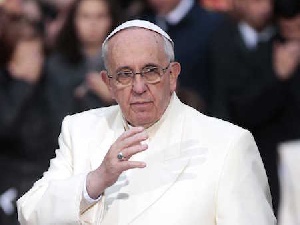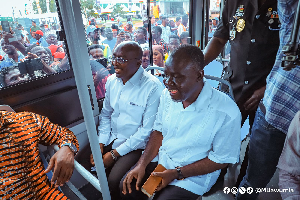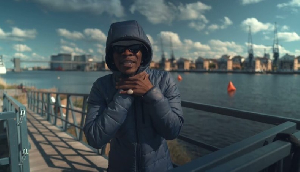Anyone who thought that Pope Francis was going to issue his climate change manifesto, and then recede quietly into the background on the issue was sorely mistaken.
In fact, judging from his agenda this week, it’s clear that Francis intends to be a major player in spurring leaders to combat global warming, which he sees as inextricably linked to efforts to lift the plight of the world’s poor.
This week, the Vatican’s science committees will host two days of meetings with 50 mayors and governors from around the world; they will discuss ways to implement policies aimed at curbing greenhouse gas emissions, boosting resilience to climate extremes and eradicating poverty.
The meetings on July 21 and 22, which are taking place under the auspices of the Pontifical Academy of Sciences and Pontifical Academy of Social Sciences, are expected to include Francis’ participation.
The session on July 21 is called, “Modern Slavery and Climate Change: The Commitment of The Cities,” while July 22 will feature speakers on “Prosperity, People and Planet: Achieving Sustainable Development in Our Cities.”
Participants at the meetings will include New York Mayor Bill de Blasio, California Gov. Jerry Brown, Rio de Janeiro Mayor Eduardo Paes, as well as mayors from Africa, Europe and Asia. Twenty-three members of the C40 Initiative, a group of 75 mayors who are committed to cutting greenhouse gas emissions while improving their communities’ ability to withstand climate extremes, such as heat waves and sea level rise, are expected to attend.
Other American political leaders heading to the Vatican include San Francisco Mayor Edwin Lee, Seattle Mayor Ed Murray and Boston Mayor Marty Walsh.
The pope’s climate change encyclical, which is a formal Catholic teaching document, was produced with assistance from the Pontifical Academy of Sciences and Pontifical Academy of Social Sciences. These little-known organizations gathered scientists, theologians and other experts to advise Francis as he wrote the document; now, they are telling how to encourage solutions to the problems identified in the encyclical.
Bishop Marcelo Sanchez Sorondo, chancellor of the Pontifical Academy of Sciences and Vatican host of the mayors summit, told Mashable that he hopes the mayors agree to work on cutting their greenhouse gas emissions, while also addressing the needs of the poor.
“I hope the mayors commit to reducing local greenhouse gas emissions in their cities, and to building the resilience of the poor and those in vulnerable situations, reducing their exposure to climate-related extreme events and other economic, social and environmental shocks and disasters, including human trafficking and dangerous forced migration,” Sanchez Sorondo wrote in an email.
“I am eager to listen to the best practices that they have put in place in their cities to fight both climate change and human trafficking.”
The bishop added that representatives from the island of Lampedusa, which has been adestination for migrants crossing from Africa to Europe, will also attend.
Human trafficking has dominated headlines this year, as record numbers of migrants from Africa attempted to make the treacherous Mediterranean crossing to Europe, with many of them perishing in the process.
When asked whether Francis will interact with local officials, Sanchez Sorondo said, “Yes, I think he will be amazed at how many mayors have come to meet him.”
“I will give you an example of how important urban settlements are for Pope Francis: The [word] “city” is mentioned 29 times in the encyclical. When the pope was Archbishop of Buenos Aires, he used to support the popular movements, such as the cartoneros (garbage pickers), and would pay regular visits to people living in the slums around the big city,” he added.
Global ocean heat content was at an all-time high in 2014, during the hottest year on record.
The meetings may produce a summary of best practices and commitment from the mayors to undertake particular policy actions, according to Sanchez Sorondo. “We hope we will have a final statement as is customary at the end of all the meetings of the Pontifical Academies. It will summarize the best practices coming from the mayors, and will also represent a commitment on the mayors’ behalf towards a more inclusive, more sustainable world, starting from their cities,” he told Mashable.
Why cities are so crucial for any successful climate deal
Francis is on to something by inviting mayors to the Vatican, rather than state-level leaders, such as prime ministers and presidents.
For one thing, the majority of the world’s population now lives in cities. By 2030, that is predicted to rise to about 60%, with city’s then generating about 85% of the GDP and around three-quarters of the world’s energy-related greenhouse gas emissions, a recent report found.
The C40 Initiative, chaired by Mayor Paes of Rio, represents about 500 million people alone, according to the program’s website.
With their dense populations and concentrations of property and infrastructure, cities are also particularly vulnerable to floods and other climate impacts, as was proven by Hurricane Sandy in New York in 2012.
Rodrigo Rosa, Paes’ climate change adviser, told Mashable in an interview that Francis recognizes that while the international community has largely failed to take ambitious action on climate change, cities have stepped into the void.
“We’re going beyond the climate talk and actually doing climate action,” Rosa said. “He sees that; he understands that.”
Rosa added that the pope is approaching climate change from a different perspective than any other prominent world figure, which he sees as beneficial. “It really touches the ethical reasons behind the economic development system around the world,” he said of Francis’ encyclical.
The Vatican summit this week comes ahead of a crucial round of United Nations climate talks scheduled for early December in Paris. That meeting is aimed at drafting a new climate agreement to go into effect in 2020, but most indications suggest it will fall short of limiting global warming to less than 2 degrees Celsius (3.6 degrees Fahrenheit) above preindustrial levels.
World leaders previously agreed to that temperature target, making the failure to adhere to it particularly disheartening for many climate activists and the most vulnerable countries, such as small island states, which fear they may be swallowed by the rising tide if warming exceeds even 1.5 degrees Celsius.
“The pope has a very important role in this, as well,” Rosa said. “He stresses how much of this lack of coordination and lack of action is actually hurting people, and the most vulnerable ones are the poor people in the cities of the world.”
Cities are hoping the Paris agreement will provide them with more means to innovate and achieve major emissions cuts, he added. This would potentially include funding that would flow from international to local levels.
In the meantime, Rosa said, “The cities can get together and show what can be done.”
It’s a safe bet that Francis will nudge policymakers in the U.S. to push for climate action when he speaks at the U.N. in September, and becomes the first-ever pope to address a joint session of Congress. However, his appearance may be awkward for its many Republican members, who deny the very existence of man-made global warming.
General News of Monday, 20 July 2015
Source: Mashable

















